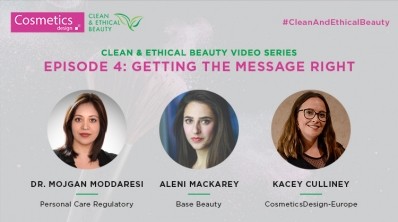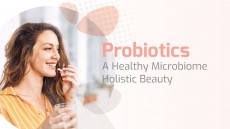MAKING SENSE OF ‘FREE FROM’ COSMETIC CLAIMS GUIDANCE: PART I
EU 'free from' cosmetics claims technical document is guidance, not regulation: Expert

Cosmetic product claims have been regulated in the European Union (EU) since July 2013, under the Commission Regulation (EC) No 655/2013. Six common criteria are required to make acceptable claims in the EU: legal compliance; truthfulness; evidential support; honesty; fairness; and informed decision-making. The regulation forms part of the main legislation on finished cosmetics products in the EU - Regulation (EC) No 1223/2009, also known as the Cosmetics Products Regulation (CPR).
New guidance on ‘free from’ cosmetic claims
In July, this year, a third version of a guidance for making cosmetic claims – the Technical document on cosmetic claims – came into force, following adjustments made in 2017. The document was published by the Sub-Working Group on Claims, part of the Working Group on Cosmetics Products - an advisory group to the European Commission (EC). It can be found HERE.
Two annexes were added to the document: Annex III, providing guidance on the application of common criteria to make ‘free from’ claims, and Annex IV, providing guidance on the application of common criteria to make ‘hypoallergenic’ claim.
The Sub-Working Group on Claims said: “This document shall only serve as a ‘tool’ and is a collection of best practice for the case-by-case application of union legislation by the Member-States. It is for the national competent authorities and national courts to assess on a case-by-case basis which claims made in relation to cosmetic products are allowed.”
Confused? It’s a guidance, not a regulation
Dr Mojgan Moddaresi, regulatory expert and director of cosmetics compliance firm Personal Care Regulatory, said ‘free from’ claims were widely used on cosmetic products, often without the correct data and claim substantiation. This Technical document on cosmetics claims, therefore, was “worth publishing”, although “should have come a couple of years earlier”, Moddaresi said
“The scientific community have to work with industry to make sure they follow these guidelines. I think this is a very good set of guidelines; it helps the consumer side because some ‘free from’ claims are not very honest,” Moddaresi told CosmeticsDesign-Europe.
One example, she said, was when a product carried a ‘free from preservatives’ claim but was actually made using a range of other ingredients that acted as a preservative.
Whilst the aim of this guidance document was to make claims regulations clearer, Moddaresi said confusion remained widespread throughout industry. Asked why, she said: “It is basically a guidance, not a regulation; that is the issue actually. And it has caused lots of, in my view, problems.”
“…I hear people complaining that the regulations on ‘free from’ aren’t happening; that they aren’t working. But that’s because it’s not a regulation, it’s a guidance. Some people mix these up.”
Implementation to differ across Member States
Regulation on cosmetics claims had been in place since 2013, but the guidance was released following industry calls to address “scaremongering” around ‘free from’ claims, Moddaresi said. The European Commission (EC) could have potentially released a specific regulation around ‘free from’ claims, but instead got its advisory Working Group to issue a guidance on the issue, she said.
“A regulation is something you have to follow; you have a Responsible Person and if you don’t follow the regulation, you are following an illegal act. But guidance is the best practice for industry, and it can be interpreted by each country and Member State,” she explained.
According to the guidance, there were now certain ‘free from’ claims considered unacceptable, she said, but many of these claims were still being made. This, she said, was because of differences in how Member States interpreted and applied guidance.
The UK and Italy were two examples of countries translating this guidance as best practice under advertising, Moddaresi said, but the likes of France and Germany had taken the guidance much more seriously, considering it closer to a regulation they would act on.
“…If the Member States decide to follow this guidance, obviously it will help the consumer in having a better decision-making process,” she said.
Stay tuned for our upcoming MAKING SENSE OF ‘FREE FROM’ COSMETIC CLAIMS GUIDANCE: PART II where CosmeticsDesign-Europe will dig deeper on how this guidance needs to be interpreted by industry and the impact it might have on business.












![Chinese study highlights mental health challenges in atopic dermatitis, emphasising holistic patient care. [Getty Images]](https://www.cosmeticsdesign-europe.com/var/wrbm_gb_food_pharma/storage/images/_aliases/wrbm_tiny/publications/cosmetics/cosmeticsdesign-asia.com/headlines/formulation-science/chinese-research-linking-atopic-dermatitis-to-mental-health-underscores-need-for-holistic-care/17040623-1-eng-GB/Chinese-research-linking-atopic-dermatitis-to-mental-health-underscores-need-for-holistic-care.jpg)








